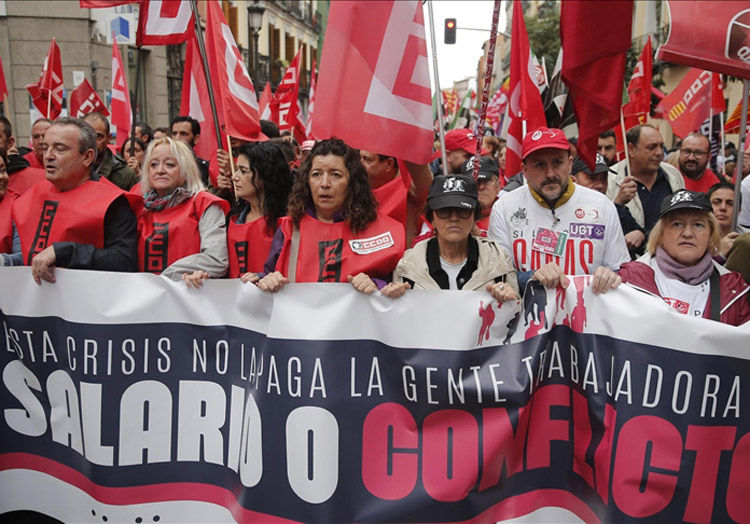The worldwide capitalist crisis is hitting working people hard, with increasing indications that we face an extended period of stagflation — a combination of continued rising prices with falling capitalist production, trade and workers’ jobs.
Soaring prices, especially on basic necessities like food, energy and housing, are lowering the real wages and standard of living of the working class. At the same time, bosses have been taking advantage of this situation to boost profits — and payouts to fellow capitalists who invest in their companies — to new heights.
“US Corporate Profits Soar With Margins at Widest Since 1950,” headlined a Bloomberg News article. U.S. oil bosses have raked in more than $200 billion in profits since Moscow invaded Ukraine, with ExxonMobil’s third-quarter profits alone hitting nearly $20 billion. As they pay out obscene dividends, Darren Woods, chief executive at ExxonMobil, cynically claimed this should be considered their way of “returning some of our profits directly to the American people.” Their real “gift” to U.S. workers is that we’re paying 18% more for gas than a year ago.
Many other bosses are profiting from raising prices well above the higher costs they face for raw materials. In mid-October, PepsiCo’s third-quarter profit grew by over 20% as the company raised its prices for drinks and chips by 17% over the year before. Both their workers and those who buy their products take the hit.
In October average hourly wages were up 4.7% over the previous year, but the consumer price index is at 8.2%, with figures for many necessities much higher. Grocery prices have soared 13%, cereals and bakery goods are up 16.2% and dairy products have risen 15.9% from a year ago.
“We go to work, and we come home. We can’t afford gas to do anything else,” Carrie Wildman, a dental hygienist who works 50 hours a week in Pikeville, North Carolina, told the Wall Street Journal. She said she voted twice for Barack Obama and twice for Donald Trump, but “at this point, I don’t trust Democrats, and I don’t trust Republicans.”
The Federal Reserve Board says 16.4% of the 164-plus million U.S. workers are holding down two or more jobs today. That’s 26 million workers.
Cashe Lewis in Denver told the Guardian she’s trying to get a third job to deal with her rent, which was jacked up by over $200. “I’m exhausted all the time,” she said. “On the one day off I have a week, I donate plasma for extra money. I’m literally selling my blood to eat because I have no choice.”
Rents, mortgages soaring
Surging rents have forced many young workers to stay or move back in with their parents, with getting a home and starting a family out of reach. Rents have risen 25% over the past two years, forcing more and more people to move in with friends and family.
At the same time, rising home mortgage rates, which reached a 20-year high of over 7% in October — double what it was a year earlier — close the door to home ownership.
With a recession increasingly likely, the number of job openings is falling. Big retailers Walmart and Amazon announced a slowdown in hiring — two months before Christmas! In response to a declining demand for durable goods, U.S. appliance manufacturer Whirlpool Corp. said in October it had cut global production by 35%.
At the same time, the number of workers counted as part of the workforce continues to decline. The labor-force participation rate, which includes adults working or looking for work, decreased for the second straight month in October, to 62.2%. Over the decades there’s been a much larger drop of male workers between the ages of 25 and 54, from 97% in 1960 to 88.5% in October this year. The creation of jobs for all “prime-age” workers actually fell in October by the most in 2 1/2 years.
This shows there are millions of workers without jobs despite the 3.7% “official” unemployment rate.
“What’s needed is a fight led by the labor movement for a shorter workweek with no cut in pay, to prevent layoffs and loss of wages,” Lea Sherman, Socialist Workers Party candidate for Congress from New Jersey, told the Militant, “and cost-of-living escalator clauses to ensure wages, Social Security and all other benefits automatically rise to match inflation. The SWP will campaign for this before and after the election.”
This deepening capitalist crisis is biting working people worldwide. Just in the last week, protests and strikes demanding higher wages and government relief from inflation took place in Zimbabwe, Ecuador, South Korea, Tunisia, Burkina Faso and by rail workers in Britain. Health care workers in Zimbabwe rejected a government offer of a 100% raise. Inflation there is now at 130%.


